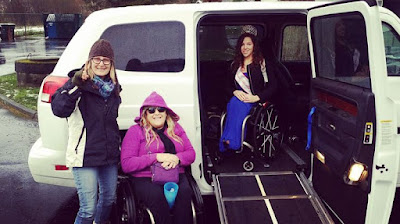RESOURCES FROM WHEELCHAIR USERS WHO ARE CURRENTLY BATTLING OR HAVE BEATEN CANCER
Paulsen is disturbed that hundreds of millions of dollars are raised for cancer research and treatment each year, but there are virtually no resources for people with disabilities — including accessible mobile mammogram trucks.
“More women are succumbing to cancer because
of their inability to get early detection, but nothing is being done to
increase mobile and other screening opportunities for people with
disabilities,” she says.
Her advice as a survivor?
“You’ve got to advocate for yourself,” she says.
“You’ve got to push, and if you’re feeling that something is wrong, don’t let your medical people talk you out of it …
just keep advocating, keep bugging, and fight for your right to
live.”



















